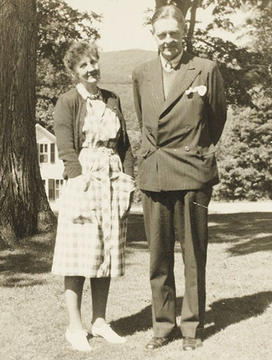Unsealed After 50 Years: Trove of T.S. Eliot’s Letters Clarify Relationship With His ‘Secret Muse’

Researchers finally got their chance to explore one of the world’s best-known sealed literary archives when 1,131 letters from T.S. Eliot to his “secret muse” and confidant Emily Hale were made available Jan. 2 at Firestone Library. A library spokeswoman said they were “very popular” but declined to provide the number of researchers.
Early readers searched the letters — most written between 1930 and 1956 — for insights into the relationship between the two, Hale’s influence on Eliot’s works, and details about his life as a poet, playwright, and critic. In his single-spaced letters, researchers told interviewers, Eliot professed his love for Hale and cited writings that she inspired, including passages of The Waste Land and Ash-Wednesday.
Hale donated the letters in 1956 with the stipulation that they not be opened until 50 years after the death of Eliot or herself, whichever was later. After learning of Hale’s decision to donate the letters to the Princeton University Library, Eliot wrote a bitter response that was to be opened when the letters were made public. In it, he claimed that he did not truly love her, and asserted that the two had never had sexual relations. He also had Hale’s letters to him burned.
Hale included her own three-page narrative with Eliot’s letters, writing about their relationship and how hurt she was when he did not propose to her. At least, she wrote, future biographers would not see “‘through a glass darkly,’ but … ‘face to face.’”











1 Response
John Haffenden
6 Years AgoTwo Points About Phrasing
I think your use of the term “bitter” with regard to T. S. Eliot’s response is to prejudge too much: There are of course many questions raised by Eliot’s statement, but “bitter” seems too categorical to me, at this stage of the critical reception and evaluation of the letters and their contexts. It is now an historical document, and one’s first contemporary reaction — in this case, “bitter” — might need to be more closely fine-tuned when the times and the circumstances are properly evaluated.
Also — perhaps more importantly — you write that Eliot “asserted” that he and Emily Hale had never had sexual relations. “Asserted” implies that the question may be open to dispute and disproof, but do you have any reason not to believe Eliot? “Eliot stated” might be nearer the mark.